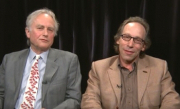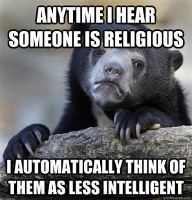 A number of people are linking to and commenting about a recent story over at Hemant Mehta’s blog, Friendly Atheist, about “The Atheist Daughter of a Notable Christian Apologist.” The apologist is Matt Slick, and the atheist is his daughter Rachael. Essentially, the article is her relatively short life story about growing up with Matt as her Dad, how he taught her what theological terms means and all about the importance of critical thinking, and how she lost her faith after leaving her parents’ home and she no longer speaks to her Dad. This is either going to be an intellectually riveting insight, or it’s going to be an intellectually vapid, classless capitalisation on someone’s family tree and a broken relationship with one of the “bad guys.” Guess which it turned out to be.
A number of people are linking to and commenting about a recent story over at Hemant Mehta’s blog, Friendly Atheist, about “The Atheist Daughter of a Notable Christian Apologist.” The apologist is Matt Slick, and the atheist is his daughter Rachael. Essentially, the article is her relatively short life story about growing up with Matt as her Dad, how he taught her what theological terms means and all about the importance of critical thinking, and how she lost her faith after leaving her parents’ home and she no longer speaks to her Dad. This is either going to be an intellectually riveting insight, or it’s going to be an intellectually vapid, classless capitalisation on someone’s family tree and a broken relationship with one of the “bad guys.” Guess which it turned out to be.
Tag: apologetics Page 2 of 4
 If there are good reasons to believe, then why does the Christian faith have some really vehement detractors?
If there are good reasons to believe, then why does the Christian faith have some really vehement detractors?
That’s the question I look at in this episode.
Glenn Peoples
Podcast: Play in new window | Download
 What’s the role of reason in faith?
What’s the role of reason in faith?
The podcast is back! This short series consists of talks that I recently gave on a speaking tour, speaking at a church camp in Auckland as well as at Thinking Matters events in Hamilton, Auckland and Tauranga. The theme was Christian apologetics, and this first talk was to set the scene on the general issue of faith and reason.
Podcast: Play in new window | Download

Minimalist Christianity is not only tactically and pastorally wise as well as charitable, but it’s also biblical.
Now for me to sell this claim, which may take a bit more work! I’m not sure how to categorise what follows. It’s not (really) theology. It’s not philosophy either. Maybe it’s somewhat “pastoral” in nature (but I’m no pastor). Take it as advice (and as advice that happens to be true, I might add).
 Episode 42 presents the “minimal facts” approach to the resurrection of Jesus.
Episode 42 presents the “minimal facts” approach to the resurrection of Jesus.
This episode doesn’t just present the argument in order to persuade you, it’s also meant to show you what the argument is like so that you can use it yourself (if you find it persuasive of course). It starts out with four facts granted by the majority of New Testament critics, and then works towards an explanation of those facts.
In this episode I refer to other blog posts and podcast episodes, and as promised here are links to those:
Merry Mithras!
Episode 19: Osiris and Jesus
Is there No Evidence that Jesus Even Existed?
Is there No Evidence that Jesus Even Exited? Part 2
Is there No Evidence that Jesus Even Exited? Part 3
Podcast: Play in new window | Download
 Apologists need to calm down and stop eating their own.
Apologists need to calm down and stop eating their own.
I will admit to jumping on a bandwagon with this one. A good recent post over at MandM alerted me to just how far and wide the phenomenon of apparently ignorant evangelicals bashing William Lane Craig is spreading based on something he said recently. Since such uninformed critique seems to spread like wildfire, I thought I would add my voice to those defending Dr Craig and calling our fellow evangelical Christians to be a little more patient and careful – as well as striving to be better informed about the theological issues we discuss.

Recently there has been some discussion here about the moral argument for theism, with a couple of correspondents announcing with great certainty (but unfortunately little else) that the argument is just terrible. I beg to differ. Today I appeared on an episode of the Unbelievable? radio show, hosted by Justin Brierley (actually we did two shows), and the other guest was atheist Arif Ahmed.
I’ll have some more things to say about the show another time (these discussions always leave one wishing that more had been said, or “I wish I had thought of this reply at the time!”, plus there are the inevitable structures of the radio show itself). For now, however, I just want to present the version of the moral argument that I used. What follows is the “prepared” version, as though I were giving a presentation on the argument – a very simple presentation, intended for a radio audience consisting of laypeople. Of course, in a discussion style radio show it wasn’t presented as one continuous explanation like this, and plenty of parts were left out. Time is short on such occasions, so not everything gets said. But you get to read it anyway 🙂 Here it is:

Some arguments are like mosquitoes. They get slapped and well and truly squashed – unambiguously defeated in plain sight for all to see, obviously crushed. The smeared body is witnessed. But then as soon as you try to relax again, that familiar whining sound fades in again. You think, Didn’t I just squash you? Yes you did, and it’s back.
As I’ve mentioned elsewhere, objections to divine command theories of ethics are a good example of arguments like this. But they’re not alone. Another is the Lottery Fallacy Fallacy. I know, calling something a “fallacy” is a bit of a rhetorical device, but I use the term because the argument that I want to rebut – again – is one that trades on using that word for rhetorical effect, so my use of the word twice must surely double the effect!

